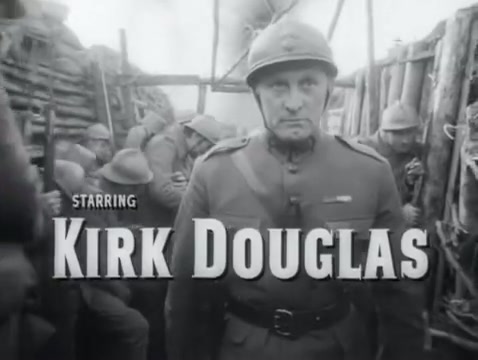Directed by:
Stanley KubrickCinematography:
Georg KrauseComposer:
Gerald FriedCast:
Kirk Douglas, Ralph Meeker, Adolphe Menjou, George Macready, Wayne Morris, Richard Anderson, Joe Turkel, Timothy Carey, Christiane Kubrick, Jerry Hausner (more)VOD (2)
Plots(1)
In the French front lines of World War I, after giving the order for an impossible and disastrous mission to capture a nearby stronghold, the upper ranks move to save face by having three randomly selected soldiers held and tried for cowardice under pain of death, Their leader, Colonel Dax (In powerhouse performance by Kirk Douglas), a former lawyer in civilian life, handles their defence against overwhelming odds. A stylistically astonishing, emotionally overwhelming anti-war drama, Paths of Glory is one of the screen's most brilliant condemnations of the power structures guiding warfare. (Eureka Entertainment)
(more)Reviews (6)
I can’t remember when was the last time I fancied so much wringing the necks of film characters. Awesome!
()
The theme is strong, dramatic and realized in the script without unnecessary loopholes, but perhaps with an overly explicit pathos of justice in some moments (however, I do not deny that in this respect I could have been influenced by the bad Czech dubbing). Given the time period and country of origin, it could certainly feel tendentious and rigid, but Kubrick's realization is virtuoso. From the initial induction of the atmosphere of the trenches (perfect passage of the camera and work with the composition), through the combat sequences to the main part – the trial with three randomly selected cowards. Kubrick curtly leads the drama of the dispute between the commanding lawyer (Kirk Douglas) and the ambition of the insane General Mireau (George Macready) and the gerontophilic sadism of General Broulard (Adolphe Menjou). He sometimes surprises with a well-chosen shot (the trial with half-details), does not blackmail the viewer in any way, but throws him a raw army lawsuit, the nonsense of the gloriola of the officer-gods and despair of helplessness of ordinary soldiers, which the machinery of his own army grinded. Nevertheless, Paths of Glory ends with a non-forgettable emphasis on humanity, which mightily impressed me with its simplicity. In terms of the time of its creation, this is a timeless film, a drama performed in the most brilliant way, a drama that is shared, unadorned and captivating.
()
Even many decades later, Paths of Glory still ranks among the most impressive (anti)war films, and very little can be criticized about it. In this film, all important emotions are concentrated and all possible character traits clash. Heroism meets cowardice, idealism meets cynicism, self-sacrifice meets selfishness, and faith meets despair. Kubrick managed to perfectly immerse the viewer in the atmosphere of trenches being bombarded by artillery shells and a desolate no-man's land torn apart by the scars of explosions and covered in the wreckage of war madness. Paths of Glory represents the pinnacle of education, especially for cinematographers. Every shot is a visual delight. The absurd scene of a military trial of alleged cowards, intended to disguise the senselessness of an attack by a weakened unit against a military fortress, is an indictment of all military and political systems that consider their citizens to be mere cannon fodder for their interests. Overall impression: 95%.
()
The film itself reminds us that it’s a Kubrick film. There are, of course, those long shots through the trenches, his composition during the leaves nothing to chance, but in the end, it still works. To be honest, I've been calling for a renaissance of interest in World War I for a long time. And then there's Adolphe Menjou, who for some unknown reason lived to see stardom in his late age, even though he's been tasty since 1915.
()
A strong theme crowned with an excellent and straightforward script, a great performance by Kirk Douglas and, of course, amazing direction by the master of masters, which can cause the kind of emotional impact that we would not expect from such an old film today. Most of the passages are conversational and the turmoil of the battle is actually incidental, but the senselessness of war and the depravity of all those who got too carried away by it are depicted perfectly, and many a person after watching the film will change their mind about enlisting in the army for good. Moreover, the single battle scene is so wonderfully shot (including the long march across the trench that precedes it) that it wouldn't be lost even today. Kubrick simply couldn't make a bad movie, which is, after all, only a logical consequence given the meticulous preparation he put into each film. :) 90%
()
How to look at the army with a critical eye? The answer is the movie "Paths of Glory" by Stanley Kubrick. The scene where the general decides to execute one soldier because he disobeyed orders and didn't die is one thing, but what follows is unbelievable. A beautiful example of how the army is turned upside down, how patriotism doesn't work because it's all about power. An incredibly intense film where from the beginning, you see that the fight for justice is pointless because you still have to obey orders and the word of the superior is more important than the word of God. And they, the superiors, are aware of it. It's beautiful how they always manage to justify it. Well, it's not beautiful, it's terrifying, but there's something amazing about it anyway. We can justify anything, to ourselves and to others. In the end, Kubrick degrades everything and everyone.
()

